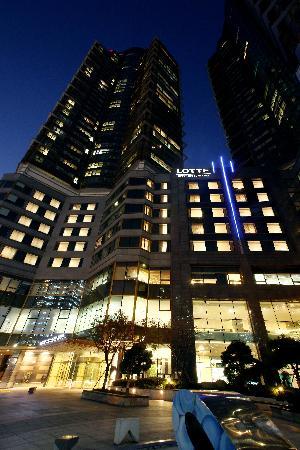
중국 및 일본 관광객 수요 급증으로 서울 시내 호텔이 최근 5년간 호황을 누리면서 새로운 성장동력을 찾고 있는 대기업들이 대거 비즈니스 호텔 시장에 뛰어들고 있다.
롯데, GS, 신라, 신세계, SK 등 대기업 계열의 비즈니스 호텔 건립 계획이 속속 나오자 기존의 서울 중심가에 위치한 중견 호텔들은 긴장을 늦추지 못하고 있다.
"지난 5년간 서울 시내 대부분의 호텔 매출이 꾸준히 늘었다. 코리아나 호텔의 경우 작년 연평균 객실점유율이 90.8 퍼센트였는데, 이는 거의 연중 내내 만실이었다고 보면 된다."고 광화문 코리아나 호텔의 황명철 객실판촉과장이 전했다.
"이러한 수요 증가 때문에 대기업들이 비즈니스 호텔을 앞다투어 여는 것이고, 대기업이 네임밸류 면에서 월등한 것은 사실이므로 당연히 우리에게 타격이 있을 것으로 예상한다."
명동에 네 곳의 호텔을 운영하고 있는 호텔 스카이파크 역시 마찬가지이다.
"대기업들이 아무래도 브랜드 네임과 마케팅력이 상대적으로 강해서 이런 점이 우려되고 있다."고 호텔 스카이파크 우혜연 과장이 말했다.
비즈니스 또는 부티크 호텔의 객실 이용료는 보통 1박당 20만원 이하이며, 단기 여행객이 주를 이루는 중국 관광객에게 특히 인기가 많다.
관광호텔업협회의 서연성 사무처장에 따르면, 서울 시내 특1급 호텔보다 비즈니스 호텔들이 영업이 잘 되고 있다고 한다.
"대기업의 비즈니스 호텔 확장에 대한 중소 회원사들의 우려를 익히 알고 있으나 이에 대한 협회 내에서의 논의는 없었다."고 서 사무처장은 말했다.
"일 년에 한번 있는 이사회 총회 외에는 회원사들끼리 만나는 것 자체를 공정위에서 담합으로 보는 경향이 있어 작년부터 조심스럽다."
서 사무처장은, 대기업이 중저가 호텔 시장에 진입하는 것에 대해서는 "큰 틀에서 시장논리로 봐야 할 것"이라 말했다.
GS 건설이 대주주인 파르나스 호텔(인터콘티넨탈 호텔 운영)은 작년 12월 명동에 중저가 나인트리 호텔을 열었고, 마포와 김포공항에서 비즈니스 호텔인 롯데 시티 호텔 브랜드로 재미를 본 롯데 호텔은 2015년 시티호텔 장교점과 명동점을 오픈할 예정이다.
신라호텔도 "신라 스테이"라는 새로운 브랜드 하에 서울 시내 5곳에, 신세계 그룹 계열의 웨스틴조선 호텔은 서울역 인근에 비즈니스 호텔을 오픈할 예정이다.
쉐라톤 워커힐을 운영하는 SK 네트웍스는 운영하는 주유소 부지 중 수익성이 낮은 곳에 비즈니스 호텔을 짓는 계획을 검토 중이다.
(코리아헤럴드 김소현 기자)
<관련 영문 기사>
Giants eye business hotels, rattling smaller firms
By Kim So-hyun
As the number of hotel rooms in Seoul runs far short of the explosive demand from Chinese and Japanese tourists flooding into the city, most downtown hotels have enjoyed a boom for the past five years.
Seeing the constant growth in tourists, the nation’s largest conglomerates are rushing to build no-frills business hotels in the city center, putting existing hotels run by smaller companies on pins and needles.
Lotte Hotel and GS Group’s Parnas Hotel have already entered the fray, while plans of Samsung’s Shilla Hotel, Shinsegae’s Westin Chosun Hotel, Hanjin’s Korean Air, SK Networks and Aekyung Group are in the pipeline.
“Sales have increased at most hotels in the city center for the past five years. Our annual average room occupancy rate was 90.8 percent last year, which means our rooms were mostly full throughout the year,” said Hwang Myung-cheol, sales promotion manager at Koreana Hotel in Gwanghwamun.
“This is why the big companies are bullish about building business hotels, and with their name value, they will obviously deal a blow to our business.”
To brace for a tough fight against goliaths, Koreana Hotel is stepping up its efforts to strengthen relationships with corporate clients by remodeling the hotel, upgrading rooms for guests and offering guest transport services, according to Hwang.
Hotel Skypark, which runs four hotels in Myeong-dong, shares the sentiment.
“The conglomerates have stronger marketing power and brand names, so it worries us,” said Woo Hye-yeon, spokesperson for Skypark.
“That is why we offer a special beauty service for female customers through collaboration with famous cosmetics companies in addition to ‘smart’ rooms where guests can open doors or change TV channels using their smartphones.”
The national trade association of hotels is aware of the unease felt by its smaller members, but has not had a chance to discuss it with the big shots.
“Apart from the annual general meeting of our board directors, the Fair Trade Commission tends to see any kind of meeting amongst our members as an attempt to fix prices, so we have been careful about meetings since last year,” said Suh Yeon-seong, director of the Korea Hotel Association.
“But both large hotels and smaller ones are our members, and conglomerates’ entry into the budget hotel business based on their capital strength should be seen from a market economy’s point of view.”
Sales are better at business hotels than at five-star, or super deluxe, hotels here as most of the demand comes from Chinese and Japanese tourists looking for no-frills accommodation within their budget and tastes, according to Suh.
Seoul has 26,000 hotel rooms -- fewer than 100 other cities around the world, such as Bangkok with 94,000. Hence, the Seoul City government welcomes all new hotel projects with open arms.
The conglomerates’ envisioned business or boutique hotels typically offer guestrooms at rates under 200,000 won per night.
Parnas Hotel -- 70 percent owned by GS Engineering and Construction, and the rest by the Korea International Trade Association -- opened its first business hotel Nine Tree Myeongdong in the central shopping district in December.
Parnas, which runs the five-star Grand InterContinental Seoul Parnas and InterContinental Seoul COEX in southeastern district of Samseong-dong, plans to build more Nine Tree hotels, although it is yet to decide how many or where.
Lotte and Shilla have both chosen business hotels as their new growth engine.
Having enjoyed brisk sales at Lotte City Hotel Mapo and Lotte City Hotel Gimpo Airport, Lotte is building two more in downtown Seoul by 2015 -- one in Janggyo and another in Myeong-dong.
Shilla plans to open five business hotels within Seoul under the new brand “Shilla Stay,” one of which will be located within 50 meters of Lotte City Hotel Mapo.
Westin Chosun is also set to open a business hotel near Seoul Station in 2014.
Although it is not a business hotel, Korean Air’s envisaged seven-star hanok-style hotel overlooking Gyeongbokgung Palace is also expected to intimidate smaller hotels in the downtown area.
SK Networks, which runs Sheraton Grand Walkerhill and W Seoul Walkerhill, plans to build business hotels on unprofitable SK gas station sites, while a smaller conglomerate Ajou is building one named Hotel Seokyo near Hongdae.
(sophie@heraldcorp.com)



![[Herald Interview] 'Amid aging population, Korea to invite more young professionals from overseas'](http://res.heraldm.com/phpwas/restmb_idxmake.php?idx=644&simg=/content/image/2024/04/24/20240424050844_0.jpg&u=20240424200058)















